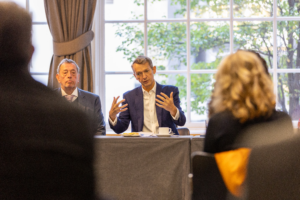Free online course explores the difficult subject of intimate partner violence and abuse
A new free online course is being launched to investigate the global issue of intimate partner violence and abuse (IPVA) a form of gender-based violence (GBV).
IPVA is thought to affect between 1 in 3 and 1 in 5 women and 1 in 6 men worldwide during their lifetime.
The University of Glasgow has launched this course to raise awareness of IPVA and to help everyone recognise the signs, respond safely, and offer basic support to anyone experiencing it.
The four-week free online course, called Gender-Based Violence: Responding to Intimate Partner Violence and Abuse, on the leading social learning platform, FutureLearn.com, is open for registration and goes live on Monday 28 March, 2022 – as Women’s History Month in March comes to an end.
The course will introduce learners to the various types of IPVA and help them to understand how it can present in different relationships. It will highlight coercive control, the most dangerous form of IPVA which became a crime under new domestic abuse legislation introduced across the UK only a few years ago. The course will also help learners understand the origins of IPVA, its pervasiveness, what drives it, how to spot it and how to support people experiencing it.
The course is endorsed by the charities Medics against Violence, White Ribbon Scotland and EmilyTest. Representatives from each charity, along with those from Scottish Women’s Aid and Men’s Aid Ireland, feature in the course outlining the work they do to raise awareness, support victim/survivors and advocate for change.
Dr Christine Goodall, Senior Clinical Lecturer and Honorary Consultant in Oral Surgery at the University of Glasgow and a founding member of Medics Against Violence is the lead contributor on the course along with Gender Historian Dr Hannah Telling of the University’s School of Humanities | Sgoil nan Daonnachdan.
Dr Goodall said: “IPVA is something I’ve sadly seen all too frequently in the course of my clinical practice.
“As a young clinician I often treated women with broken bones, slashed faces and broken teeth, suspecting abuse but I was unsure of how to raise the issue. It’s an issue that is unfortunately very common, we will all see it and it’s vital that anyone in any front-facing role has the skills to spot it and to reach out and offer support to anyone experiencing it.
“That is why I now try to ensure that people have the skills and confidence they need to offer that basic support. Coercive control is something people don’t always recognise as abuse when it is happening to them, and it can leave them feeling so worthless that they may never reach out for help. This course will give people a better understanding of what IPVA involves and what they can do to make a difference. Simple actions could be life-changing for someone.”
Dr Telling said: “As a child, I witnessed and experienced domestic abuse and the trauma that accompanies it. My own experiences have shaped my research interests and my efforts to advocate for a world free from domestic abuse: something that I believe is a possibility.
“As a historian, I’m a firm believer in the idea that ‘the past informs the present.’ There is still a persistent culture of shame and silence that surrounds IPVA. In my view, much of this is informed by myths, misconceptions, and stigma associated with IPVA that have long-standing historical roots.
“By knowing our history, we are better placed to understand the persistent obstacles to freedom and safety that victim/ survivors continue to face today. This course will introduce people to the long – and often shocking – history of IPVA. In the process, it will provide people with the knowledge and tools to tackle it in our modern world. Scottish Women’s Aid say, ‘changing attitudes changes lives’. Signing up to this course is a small, but powerful step in the right direction.”
Astrid deRidder, VP of Content and Learning at FutureLearn, said: “Domestic abuse and violence are tragedies no-one should ever experience. We hope that partnering with The University of Glasgow to deliver such a vital course will help to play an important part in educating everyone on how to identify such situations, as well as understand the drivers, so that we can stop the cycle of violence in the future.”
The University and FutureLearn are donating 10% of any profits from learners who pay for the upgraded course option to the charity White Ribbon Scotland.
Davy Thompson, Campaign Director at White Ribbon Scotland, which is the largest effort in the world of men working to end men’s violence against women, said “As an autonomous part of the largest worldwide campaign which addresses issues of violence against by involving more men in the solution, White Ribbon Scotland is pleased to support and participate in this educational tool designed to help people address IPVA.
“Men are beginning to have a much better understanding of coercive control and its implications, particularly in respect of domestic abuse. As a crime mostly, but not exclusively, perpetrated by men against women it is important that men understand the away in which they can become allies in the effort to end it. This is not collective responsibility for the crimes carried out by our fellow men; rather it is accepting the responsibility we have as members of the society in which it is committed to help eliminate it.’
Notes to Editor
Gender-Based Violence: Responding to Intimate Partner Violence and Abuse Course
Intimate partner violence and abuse (IPVA) and gender-based violence (GBV) are global issues. They are so prevalent that they will touch everyone in some way, whether that is through patients, acquaintances, or personal experience. For this reason, it is an area everyone should be knowledgeable about.
This four-week course will introduce you to the types of IPVA and how it can present itself in different relationships. You’ll understand the pervasiveness of IPVA, what drives it, and learn how to support people experiencing IPVA. Learn more about the course by visiting the FutureLearn course webpages
The University of Glasgow
The University of Glasgow has been changing the world since 1451. The University is the current Scottish University of the Year in the Times and Sunday Times Good University Guide 2022 and is a world top 100 university (THE, QS)
The University is a member of the prestigious Russell Group of leading UK Universities and annual research income of more than £180m.
As a major employer in the city, the University of Glasgow contributes more than £4 billion to the UK economy as evidence based in its new economic impact report.
The University’s #TeamUofG community is truly international with over 9000 staff and 30,0000 students from more than 140 countries worldwide.
FutureLearn
FutureLearn is a global learning platform with a mission to transform access to education by offering top online courses from the world’s leading universities and brands. From microcredentials and degrees to ExpertTracks and short courses, FutureLearn offers accredited and unaccredited world-class education that is 100% online, on-demand, and social. Founded in 2012 by The Open University, FutureLearn has built a global network of over 18 million learners, hosted over 5,000 online courses, and partnered with more than 250 top universities, leading global brands, and government departments – such as the University of Cambridge, the University of Glasgow, Deakin University, Samsung and Health Education England. The wide-ranging courses available allow learners to expand their interests, unlock highly skilled new career paths, and help change the world.
Support
If you have been affected by the contents of this course, there are a number of helplines that are available on the course that give you guidance or help. The pdf of the support resources can be accessed here – Gender-Based Violence: Responding to Intimate Partner Violence & Abuse Support :
- Breathing Space (Scotland) 0800 838587 can help if you are feeling overwhelmed for any reason
- Victim Support Scotland 0800 160 1985 can help if you have been a victim of crime in Scotland
- Victim Support UK 0808 168 9111 can help if you have been a victim of crime in England and Wales
- Samaritans (UK) 116 123 can help if things are getting too much and you need someone to speak to
- Rape Crisis Scotland 08088 01 03 02 can help if you are concerned about issues around rape and sexual assault in Scotland
- Scottish Domestic Abuse and Forced Marriage Helpline 0800 027 1234 can help if you are concerned about violence or controlling behaviour in your relationship or that of a friend or family member and live in Scotland. They also provide advice and support about forced marriage.
- Abused Men in Scotland 03300 949 395 for men experiencing domestic violence or abuse in Scotland
- National Domestic Abuse Helpline 0808 247 2000 for women, children and men experiencing domestic violence or abuse in England and Wales
- The National Domestic Violence Hotline for anyone living in the USA concerned about intimate partner violence or abuse 1-800 799 7233 or text START to 88788
- Hot Peach Pages a list of global support contacts for violence against women and girls
- If you are a woman concerned about IPVA within an LGBTQ+ relationship and live in Scotland you can contact Scottish Women’s Aid 08000271234
- If you are a man concerned about abuse within an LGBTQ+ relationship and live in Scotland you can access support via FearFree
For BAME women
- Shakti Women’s Aid 0131 475 2399
- Hemat Gryffe women’s Aid 0141 353 0859
- Women’s Aid also list a number of specialist organisations on this page of their website


